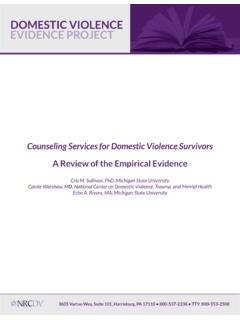Transcription of Counsellors’ Guide working with EAPs
1 UK Employee Assistance Professionals AssociationCounsellors Guidetoworking with EAPsUK EMPLOYEEASSISTANCEPROFESSIONALSASSOCIATI ON| counsellors Guide TO working WITHEAPS1UK EMPLOYEEASSISTANCEPROFESSIONALSASSOCIATI ON| counsellors Guide TO working Introduction .. EAP background and history .. Clinical aspects of EAP service delivery ..4 Therapeutic modelsWorking with an EAPQ ualificationsTripartite relationshipPotential ethical issuesTypes of counselling Holding referralsCoachingRequests for extra sessionsWorking with the organisationEnabling a to return to work Confidentiality and managing The practicalities of working as an EAP counsellor .. 9 Affiliate safetyProfessional and business-like behaviourWorking with the EAP providers case management teamBeing organisationally awareRecord keeping and case notes InsuranceIndividual CRB/DBSP remisesHealth and Safety Commercial aspects of EAP work ..12 How do EAP providers charge for their services?
2 How do EAP providers pay counsellors ?How do I apply to become an EAP counsellor?Referral Hints and tips for affiliate counsellors ..14 Speed of response and flexibilityConfidentialityPartnering with your EAP providerOther skills and experienceIT and technologySelf-managementManaging your session limitsContinuous professional developmentManage your Sources of further information .. IntroductionThis document has been produced by the UK Employee Assistance ProfessionalsAssociation (UK EAPA), the professional body for the EAP industry in the UK. It isdesigned to provide a practical Guide to working with EAPs for counsellors andpsychotherapists and covers the principle aspects of delivery of these Guide focuses on elements that are common across the industry. However, it is notintended to be exhaustive or definitive as different EAP providers will work in slightlydifferent ways. Each provider will have its own processes and protocols that it requiresits counsellors and psychotherapists to work EAP background and historyThe EAP industry began in the UK during the mid-1980s and has since grown, with EAPsbecoming an established and popular service for employees.
3 Today a high percentageof the larger public and private sector organisations and an increasing number of smallto medium sized enterprises provide their employees with access to some form of EAPservice. In fact, almost 50% of the UK workforce is now supported by an EAP, million people (UK EAPA Market Watch, 2013). In comparison, the number of livestouched by EAPs in 2008 was estimated at programmes can vary considerably in terms of the types of support they offer, butmost will include clinical and non-clinical elements designed to support employees ona broad range of personal and work related clinical elements might include telephone counselling, often delivered bycounsellors who are directly employed by the EAP provider, and face-to-facecounselling, usually delivered through a network of contracted affiliate providers are also offering online access to counselling, either through live-chat, secure portal communication systems or self-directed computer platforms such asthe Beating the Blues CBT package.
4 Non-clinical elements of EAPs might comprise access to high level legal or financialinformation, debt advice, or general information and advice similar to that which mightbe offered by the Citizens Advice Bureau. Here, providers will generally use a blend ofdirectly employed staff and/or third party specialist providers to deliver these professional body for the EAP industry in the UK is the UK EAPA, which isresponsible for promoting the interests of the industry, setting standards for delivery ofEAP services and fostering the development of EAPs. UK EAPA also publishes a range ofdocuments, including EAP Guidelines, EAP Buyers Guide and Standards of ProfessionalPractice that are designed to promote best practice in the industry and educatepurchasers of EAP services. More information on the UK EAPA and the EAP industry can be found EMPLOYEEASSISTANCEPROFESSIONALSASSOCIATI ON| counsellors Guide TO working WITHEAPS3A practical Guide to working with EAPsfor counsellors andpsychotherapists Clinical aspects of EAP service deliveryThis section highlights some of the clinical aspects of EAP service delivery that shouldbe considered by counsellors and psychotherapists working with EAPs.
5 Therapeutic models Solution Focused Brief Therapy: The most common form of therapeuticintervention delivered by EAPs is Solution Focused Brief Therapy, although anintegrative approach is also popular as this gives maximum flexibility to adaptaccording to the client. Typically EAPs offering access to face-to-face counsellingwill cap the number of sessions available to each eligible member annually. Thislimit can be as many as eight or as few as one or two, but five or six sessions are more typical. CBT: Some EAP providers will incorporate elements of CBT into theirtherapeutic model. However access to a full CBT intervention will normally only be available outside the core EAP and will attract an additional charge. Other therapeutic models: counsellors and therapists may also offer othertherapeutic practices , such as Eye Movement Desensitisation and Reprocessing(EMDR), Emotional Freedom Technique, Hypnosis or Psychoanalysis. You shouldconfirm with the EAP provider whether this forms part of their preferred coremodel or if it relates to services that incur an additional charge to the providers will have different policies on with an EAPEach practitioner will have their own approach to short term work and this is likely tobe influenced by their style as well as their training.
6 It is important that the challengesand implications for short term contracts with clients are fully understood. The EAPprovider will usually discuss their clinical assessment with the affiliate counsellor, whoshould also be prepared for the clinical picture to change by the time they see theclient, particularly for clients that present in crisis. Short term therapy may be a solution in itself or a first step to open ended or longerterm work. Often the EAP is used to support clients while they are on NHS waiting listsor looking for or needing other treatment. Whichever is the case, the affiliatecounsellor must manage the work carefully so that the ending is clear from the working with EAP clients, affiliate counsellors need to consider the EAP providerwho is still contractually responsible for the case. They should be included in yourreporting and you may be required to complete additional documentation.
7 Often sharingsuch responsibility can be uncomfortable for an affiliate counsellor, especially if they arenew to EAP work. Therefore, it s important to think about this aspect of the work carefullyand, where necessary, discuss it in supervision, to confirm that EAP work is right for you. Each EAP provider is likely to have different approaches to programme elements suchas private contracting with clients, payment rates and case management may be asked to sign terms of engagement or a contract; do check exactly what isrequired of you before you start. The commercial considerations of working with an EAPprovider, including contracting, are discussed later in this of the many benefits of working as an EAP affiliate counsellor is that if problemsarise you will receive clinical support from the EAP provider. This can come from adedicated Case Manager or Affiliate Management team who will be able to workcollaboratively with you to find a resolution to the EMPLOYEEASSISTANCEPROFESSIONALSASSOCIATI ON| counsellors Guide TO working WITHEAPS4 Often the EAP is usedto support clientswhile they are on NHS waiting lists QualificationsAccording to the Standards of Practice & Professional Guidelines for EAPspublishedby UK EAPA, all those involved in the delivery of EAP services must be professionallyqualified and have an understanding of and specialised training in EAP practice, befamiliar with and work consistently within the UK EAPA Code of Ethics and be selectedby the provider against appropriate criteria that reflects their this framework, each EAP provider will have its own qualification andexperience requirements for affiliate counsellors .
8 Most, however, will require a Mastersor other post-graduate diploma in counselling, a minimum of three years postqualification experience and accreditation to one of the recognised professional bodiessuch as the BACP, UKCP or the HCPC for tite relationshipThe EAP is a confidential service, but EAP providers have a contractual relationship andduty of care not only to those who are accessing their services for support, but to theemployer that has contracted with the provider to deliver them. It is important that theaffiliate counsellor recognises the nature of this tripartite relationship and its potentialimpact on the counselling process. For example, the fact that EAP counselling sessions are funded by the client s employermay lead to feelings of anxiety in the client over the confidentiality of the process andconcerns that information may be reported back to their employer. Alternatively it maytrigger feelings in the client of being entitled to a certain number of sessions.
9 Suchconcerns may or may not be articulated by the client during counselling, but youshould be aware of them as potential factors and make a determination on a case-by-case basis as to whether this is something you need to explore in more detail with them. Another example concerns those situations where the client has been formally referredto the programme. Most EAPs allow the formal referral of employees, usually by amanager or HR. Such referrals usually account for a relatively small percentage of thetotal case volume and normally occur when there is a work performance, attendanceor behavioural issue. As such they often happen within the context of a widerdisciplinary should be understood that formal referrals can only be made with the full consultationand co-operation of the individual and in these circumstances the reaction of the clientand their attitude toward the counselling process must be considered.
10 This may bepositive, for example, My employer really cares about or negative, I m only herebecause I ve been told to be, I don t need counselling, there s nothing wrong with . At the briefing stage all reporting requirements should be clarified so that from the veryoutset of your work with the client all feedback requirements are fully understood, thatthe client is not coerced to attend, that it is voluntary and informed consent is ethical issuesAs with private practice or other counselling work, EAP work can involve the potentialfor conflicts of interest . For example, you may be asked to see someone you know, orsee a colleague or close relative of an existing client. The possibilities for a conflict ofinterest are many and complex. If they do occur you will need to consult the EAPprovider s guidelines and seek a Case Management consultation to work out how bestto solve the case managers will also be experienced in managing potentially contentious issues,such as the client asking for support to leave their job or a client who is consideringtaking legal action against their employer for some reason.





